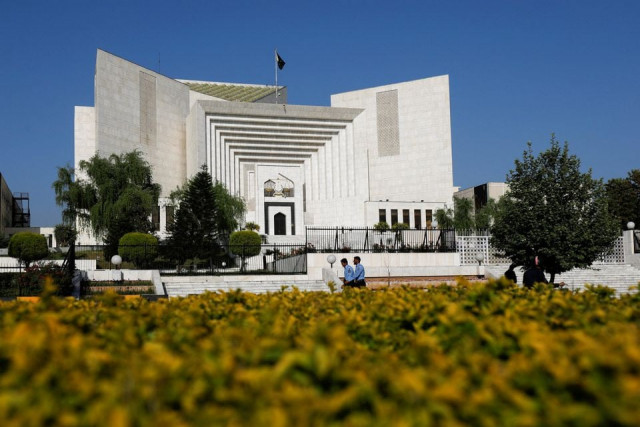‘SC order infringes on ECP’s autonomy’
Centre, Punjab argue that apex court does not have authority to give election dates

As a three-judge bench of the Supreme Court resumes hearing the Election Commission of Pakistan (ECP) review petition against its April 4 order today (Tuesday), the federal government contends that the bench’s order encroached on the autonomy of the ECP.
"Jurisdictional overreach by virtue of [the] order dated 04-04-2023 by encroaching upon the exclusive domain of the petitioner body [ECP] therefore infringes upon the independence and autonomy of the [ECP],” said a concise statement submitted by the federal government through Attorney General for Pakistan (AGP) Mansoor Awan.
“[The order is] violating the principles enshrined in the Constitution and the [Election] Act 2017 that has carved out a specific and special role for the [ECP], " it added.
The statement stated that the concept of "political justice," as envisioned in the Objectives Resolution, has become an integral component of our Constitution, embodying the ideals and values that shape our democratic system.
“By virtue of announcing a poll date by encroaching upon an autonomous body mandated with the powers to safeguard the votes of the people and ensure free and fair elections, the concept of political justice stands eroded and polluted,” it added.
According to Express News, the Punjab chief secretary on Monday also submitted a written reply to the top court on behalf of the Punjab caretaker government with regard to the announcement of a date by the SC for holding elections for the Punjab Assembly.
A three-judge bench led by Chief Justice of Pakistan Umar Ata Bandial on April 4 ordered the ECP to hold elections in Punjab on May 14.
The parliament while passing a resolution against the bench later also rejected a bill seeking funds for holding in Punjab and Khyber Pakhtunkhwa (K-P). The ECP later also filed a petition, contending that the court did not have the authority to announce election dates.
In its reply, the Punjab government said that the apex court went beyond its jurisdiction when it ordered the polls supervisory authority to hold elections on May 14. Under Article 218 of the Constitution, only the ECP has the power to conduct fair and transparent elections, it said.
It said that “in view of the division of powers, the Supreme Court did not give the date for the Khyber-Pakhtunkhwa elections”, adding that only the ECP has the authority to change election schedules.
The caretaker government argued that after the arrest of Pakistan Tehreek-e-Insaf (PTI) chief Imran Khan on May 9, the civil and military properties were damaged and 126 police personnel got injured, and rioters also set fire to 97 police vehicles.
After May 9 riots, the security situation in the province has changed, it claimed adding that 554,000 security personnel are needed to conduct the provincial assembly elections but only 77,000 personnel are available right now.
In its reply, the ECP earlier argued that it is its solitary domain to change election schedules under Section 58 of the Elections Act, 2017. It claimed that the SC’s April 4 order was “per incuriam—lacking regard to the law or the facts—to the Constitution, law and previous judgments”.



















COMMENTS
Comments are moderated and generally will be posted if they are on-topic and not abusive.
For more information, please see our Comments FAQ